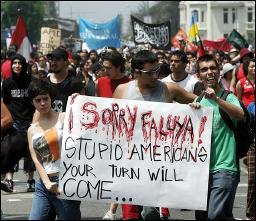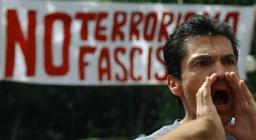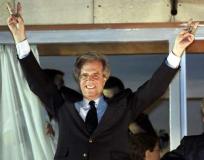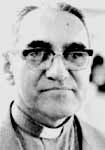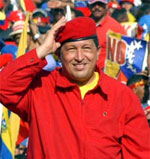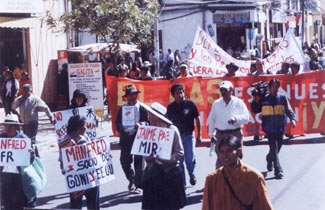Feature Archives
Sat Nov 20 2004
Protesters Greet Bush In Santiago
11/19/2004: In his first overseas trip since his reelection, President Bush arrived in Chile on 11/19 to use what he calls his "new capital" to press the 21 nations of the Asia-Pacific Economic Cooperation summit to help with North Korea, terrorism and opening up regional trade. But Bush's Latin American trip had sparked a backlash before he even arrived. Chilean police in armored vehicles used tear gas and water cannons to break up demonstrations against U.S. policy in Iraq, Bush's presence in Chile and a summit that protesters called a rich man's club. On the fourth day of anti-American and anti-APEC protests, a massive crowd marched through downtown Santiago. Many shouted chants or held signs saying "Terrorist Bush" and "Bush: Fascist, thief, murderer." Read more | Photos | More coverage on Globalization page
Sat Nov 20 2004
Prosecutor in Chávez Coup Inquiry Is Assassinated
Danilo Anderson, 38, was driving to his home in Caracas on Thursday night when his Jeep exploded. The bomb was activated by remote control and designed to explode upwards, said officials. "This was a political assassination," says Venezuela's information minister, Andres Izarra. Mr. Anderson was highly prominent in Venezuela for leading several cases against opponents of President Chávez, including an investigation into nearly 400 right-wingers who supported the military coup attempt against him. The president was ousted for two days in 2002 before loyalist troops returned him to power. Mr. Anderson had also prepared the case against a group of army officers who declared themselves in open rebellion against Mr. Chávez. Some of these, now living in exile in the U.S., have been accused of links to last year's bombings at the Spanish and Colombian embassies in Caracas. Read more
In other news from Caracas, a new libertarian center and social library opened its doors on 11/14/2004.
In other news from Caracas, a new libertarian center and social library opened its doors on 11/14/2004.
Mon Nov 1 2004
Leftist Coalition Wins Presidency in Uruguay Election
A coalition of guerrillas, socialists, communists, and social democrats are celebrating victory in Uruguay, with all exit polls predicting that Tabaré Vázquez, a doctor from Montevideo, won the national election held on Oct. 31; his two opponents have already conceded. The leftist coalition, Frente Amplio (Broad Front), has also achieved a strong majority of both legislative bodies. Uruguay's two traditional major parties have been defeated for the first time since independence from Spain in 1825; a proposal for water privatization was also defeated. Full coverage at Uruguay Indymedia
Wed Oct 13 2004
International Caravan for Justice
An International Caravan for Justice will take 5 routes, each visiting about 11 cities, in its trip across the United States, from Canada to Mexico, beginning on October 18th.
Cities that the Caravan is planning to visit include: San Francisco, Sacramento, San Diego, Los Angeles, Albuquerque, Houston, Madison, Atlanta, Cambridge, Chicago, Washington, DC, and many more. The events to be held in many cities in North America will raise consciousness about
the horrific murders and disappearances along the
US-Mexico border, in Juarez and Chihuahua, Mexico. Violence against women is continuing, as
young women who work in the maquiladoras continue to
disappear. Murder is rampant as long as impunity prevails.
The Caravan is demanding action by authorities on both sides
of the border. The Caravan will arrive in Juarez on October 31st, an educational conference will be held there on November 1st, on November 2, Caravanistas will participate in Day of the Dead Events; on Wednesday, November 3, and after meeting with local authorities, they will travel to Chihuahua City on November 3rd for a Thursday, November 4th meeting with Chihuahua state authorities and Press conference.
The International Caravan for Justice will be in San Francisco on October 24th, at 7:00 pm at New College of California's Cultural Center, 766 Valencia Street. More Details about this event on Indybay's Womyn Page
The International Caravan for Justice will be in San Francisco on October 24th, at 7:00 pm at New College of California's Cultural Center, 766 Valencia Street. More Details about this event on Indybay's Womyn Page
Fri Sep 3 2004
Modesto Man Liable in Death of Archbishop Romero
9/03/04:
Judge Wanger issued an historic decision today, finding Modesto resident Alvaro Saravia responsible for his role in the assassination of Archbishop Oscar Romero of El Salvador. Romero was killed as he was saying mass on March 24, 1980. Judge Wanger ordered Saravia to pay $10 million to the plaintiff, a relative of the Archbishop, who has still not been identified for security reasons. Archbishop Oscar Romero was one of the most revered advocates for human rights in the Americas. The trial, which started last month, concluded on Friday, September 3. See a report from the first day of the trial here and here. See video of the support rally held outside of the Federal Building here. The hearing was the culmination of a lawsuit brought against Modesto resident Alvaro Rafael Saravia for his role in organizing the assassination. Saravia, a former Captain in the Salvadoran military, was the right-hand man to reputed Salvadoran death squad leader Roberto D’Aubuisson. For more information about this case go to the Center for Justice and Accountability web site. Also see the Central Valley IMC Page
Mon Aug 16 2004
President Hugo Chavez Wins Venezuelan Referendum
8/16: On August 15th, 2004, a referendum was held in Venezuela to decide if Hugo Chavez should remain President of that country. At 4:03 this morning, it was announced that 58.2% of the voters had said that Chavez will stay in power. Election monitors from the Organization of American States found no irregularities and former President Jimmy Carter proclaimed the election results were accurate. Opposition leaders rejected the results, claiming "gross manipulation," but could offer no details. Meanwhile, oil prices reached a record high on Monday amid concerns about production disruptions due to the referendum.
Hugo Chavez was first elected president in 1998. During his first term, the national constitution was substantially revised. Included was a provision that if 20% of the electorate requested a vote on the validity of a president's mandate, a recall referendum could be held halfway through the term.
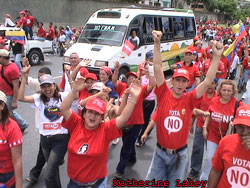
In April 2002, Chavez was briefly removed from office when corporatists seized power with the backing of the armed forces. As people outside of Caracas confusedly tried to follow the events on international television, the coup and its backers took over nearly all electronic media within the country. Websites such as Trinicenter/Venezuelanalysis.com and NarcoNews helped to get the truth out to the world.
After failing to bring down Chavez through extra-parliamentary means, the opposition group, Coordinadora Democratica, opted for an attempt to oust him via an 'electoral solution' in an accord they signed with the government, the OAS, and the Carter Center.
Film: The Revolution Will not Be Televised (a.k.a. Chavez the Film) | Z-Net's Venezuela Watch | V-Headline | Declassified Documents about US interference in Venezuela | Venezuela 2 years after the coup | WTRG Economics | Puerto Rico Indymedia's Venezuela Coverage | Indymedia UK's Venezuela Coverage | Past Indybay Coverage of the Venezuelan Presidential Crisis
Hugo Chavez was first elected president in 1998. During his first term, the national constitution was substantially revised. Included was a provision that if 20% of the electorate requested a vote on the validity of a president's mandate, a recall referendum could be held halfway through the term.

In April 2002, Chavez was briefly removed from office when corporatists seized power with the backing of the armed forces. As people outside of Caracas confusedly tried to follow the events on international television, the coup and its backers took over nearly all electronic media within the country. Websites such as Trinicenter/Venezuelanalysis.com and NarcoNews helped to get the truth out to the world.
After failing to bring down Chavez through extra-parliamentary means, the opposition group, Coordinadora Democratica, opted for an attempt to oust him via an 'electoral solution' in an accord they signed with the government, the OAS, and the Carter Center.
Film: The Revolution Will not Be Televised (a.k.a. Chavez the Film) | Z-Net's Venezuela Watch | V-Headline | Declassified Documents about US interference in Venezuela | Venezuela 2 years after the coup | WTRG Economics | Puerto Rico Indymedia's Venezuela Coverage | Indymedia UK's Venezuela Coverage | Past Indybay Coverage of the Venezuelan Presidential Crisis
Mon Jul 19 2004
Bolivia Says "NO" to Transnational Gas Privatization
7/18/04: Since last October, the Bolivian people have been in an uproar over the government's plans to privatize the nation's supply of natural gas. Today was the date designated by President Carlos Mesa for a referendum to be held, a referendum which would decide the fate of the country's entire supply of hydrocarbons. Unfortunately, it has fallen dramatically short of the promises shelled out by Mesa when he was making a bid for the people's support, after watching them run the previous President out of town. In fact, it is nothing more than a vote on how transnational companies can privatize the natural gas resources in Bolivia, an attempt to make the people complicit in their own demise. Unions and local community organizations around the country have fought back against this slap in the face, calling on Bolivian citizens to abstain from the five-question vote in protest. Record numbers of Bolivians have done this, flouting the mandatory voting process by spoiling their own votes, rendering them invalid. Marches and blockades are also being organized, as tensions mount in Bolivia. PHOTOS:
1|
2|
3|
4|
5|
6|
7|
8|
9|
10
Bolivia Indymedia | Free Speech Radio News Report (eng) | Bolivia IMC Radio report (esp) | NarcoNews
UPDATE - 7/19/04: The Bolivian and American press are already spinning the "success" of the referendum as a victory for "democracy", decrying the "anti-democratic" actions of the Bolivian people who chose to abstain from the faux vote, especially the indigenous groups who would be most hard-hit by the gas pipeline plans. Indigenous leaders across the country reaffirm that the only hope in sight is to take the country back through another popular uprising.
Americas:
 25
25



